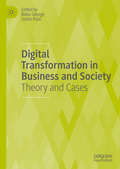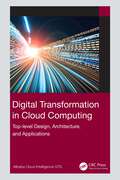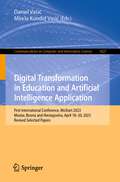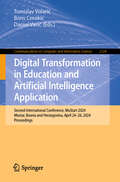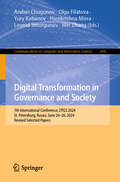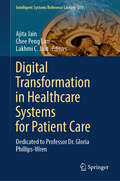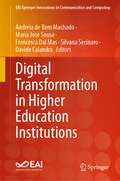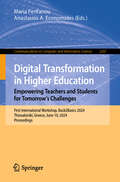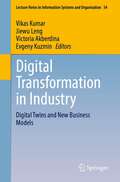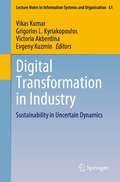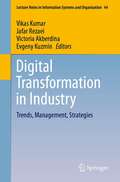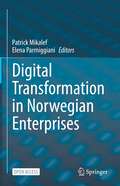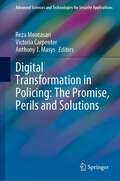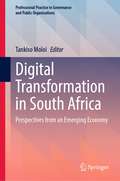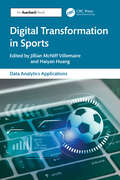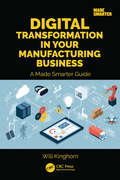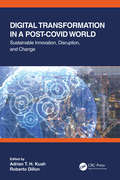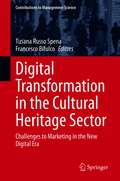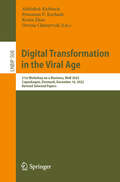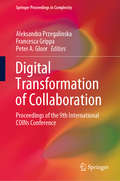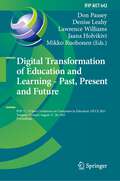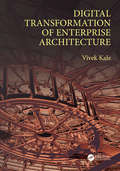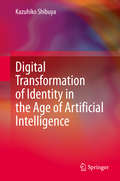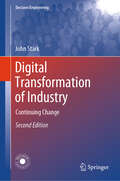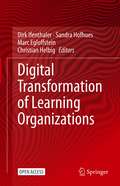- Table View
- List View
Digital Transformation in Business and Society: Theory and Cases
by Justin Paul Babu GeorgeThe digital traces that people leave behind as they conduct their daily lives provide a powerful resource for businesses to better understand the dynamics of an otherwise chaotic society. Digital technologies have become omnipresent in our lives and we still do not fully know how to make the best use of the data these technologies could harness. Businesses leveraging big data appropriately could definitely gain a sustainable competitive advantage. With a balanced mix of texts and cases, this book discusses a variety of digital technologies and how they transform people and organizations. It offers a debate on the societal consequences of the yet unfolding technological revolution and proposes alternatives for harnessing disruptive technologies for the greater benefit of all. This book will have wide appeal to academics in technology management, strategy, marketing, and human resource management.
Digital Transformation in Cloud Computing: Top-level Design, Architecture, and Applications
by Alibaba Cloud GTSWith the rapid development of cloud computing and digital transformation, well-designed cloud-based architecture is always in urgent need. Illustrated by project cases from the Chinese technology company Alibaba, this book elaborates how to design a cloud-based application system and build them on the cloud. Cloud computing is far from being just a resource provider; it offers database, storage and container services that can help to leverage key advantages for business growth. Based on this notion, authors from the Alibaba Cloud Global Technology Services introduce new concepts and cutting-edge technology in the field, including cloud-native, high-availability and disaster tolerance design on cloud, business middle office, data middle office, and enterprise digital transformation. Resting upon Alibaba’s years of practice and achievements in the field of cloud technology, the volume also elucidates the methodology and practice solutions of digital construction, including methodology, product tools, technical processes, architecture design, cloud application capacity assessment and optimization, etc. The book will appeal to researchers, students, and especially IT practitioners, professionals, and managers interested in cloud computing, digital transformation, cloud migration, business middle office, data middle office, as well as the Alibaba Cloud itself.
Digital Transformation in Education and Artificial Intelligence Application: First International Conference, MoStart 2023, Mostar, Bosnia and Herzegovina, April 18–20, 2023, Revised Selected Papers (Communications in Computer and Information Science #1827)
by Daniel Vasić Mirela Kundid VasićThis book constitutes selected papers presented during the First International Conference on Digitization in Education, MoStart 2023, held in Mostar, Bosnia and Herzegovina, in April 2023.The 12 presented papers were thoroughly reviewed and selected from the 30 submissions. The proceedings cover a diverse range of topics, including artificial intelligence and robotics in education, games and simulations, intelligent tutoring systems, augmented and virtual reality, natural language processing, computer vision, IoT and metaverse applications, learning analytics, deep learning, and ethical issues in AI applications in education and law.
Digital Transformation in Education and Artificial Intelligence Application: Second International Conference, MoStart 2024, Mostar, Bosnia and Herzegovina, April 24–26, 2024, Proceedings (Communications in Computer and Information Science #2124)
by Daniel Vasić Tomislav Volarić Boris CrnokićThis book constitutes selected papers presented during the Second International Conference on Digital Transformation in Education and Artificial Intelligence Applications, MoStart 2024, held in Mostar, Bosnia and Herzegovina, in April 2024. The 17 papers were selected from the 32 submissions. The proceedings cover a broad range of topics, computer vision, natural language processing, and the latest advancements in the digital transformation of education. Notably, the application of artificial intelligence, the incorporation of gamification and robotics into learning processes, and innovative technologies such as IoT, have been thoroughly explored.
Digital Transformation in Governance and Society: 7th International Conference, DTGS 2024, St Petersburg, Russia, June 24–26, 2024, Revised Selected Papers (Communications in Computer and Information Science #2445)
by Wei Zhang Yury Kabanov Andrei Chugunov Olga Filatova Harekrishna Misra Leonid SmorgunovThis book constitutes refereed proceedings of the 7th International Conference on Digital Transformation in Governance and Society, DTGS 2024, held in St. Petersburg, Russia in June 24–26, 2024. The 10 full papers presented in this volume were carefully reviewed and selected from 35 submissions. These papers deal with various aspects of Digital transformation in governance and society, focusing on digital governance, smart cities, and communication on social media, with a special emphasis on the experience of developing countries.
Digital Transformation in Healthcare Systems for Patient Care: Dedicated to Professor Dr. Gloria Phillips-Wren (Intelligent Systems Reference Library #279)
by Lakhmi C. Jain Chee Peng Lim Ajita JainThis book presents innovative solutions for disease management, elderly care, rehabilitation, surgical decision-making, and health data security. This book explores the transformative impact of Artificial Intelligence (AI), machine learning, and smart technologies on modern healthcare. Addressing wearable devices, digital twins, assistive technologies, and ethical AI implementation, the book highlights how digital advancements enhance diagnostics, treatment personalisation, and patient outcomes. With contributions from leading experts, this collection serves as a vital reference for healthcare professionals, researchers, and policymakers shaping the future of patient-centred, data-driven medicine.
Digital Transformation in Higher Education Institutions (EAI/Springer Innovations in Communication and Computing)
by Silvana Secinaro Maria José Sousa Andreia de Bem Machado Francesca Dal Mas Davide CalandraThis book analyzes digital technologies being used in the teaching-learning process. The authors show how the use of AI in higher education can provide personalized education through the automation of administrative teaching tasks, software programs that favor the detection of topics that need reinforcement in the classroom, the guidance and support of students outside the classroom, and the use of data intelligently to teach and support students. In addition, the authors show how to further personalize education with the use of augmented reality, adaptive platforms, intelligent tutor systems, Chatbots, adaptive learning, computer aided instruction, MOOCs, and robotics. The authors answer questions such as: What sustainable educational technologies can be used in the teaching-learning process; How can Blockchain technology and AI be applied in higher education; How can the metaverse be applied in virtual learning environments? The book is relevant to researchers, professionals, andstudents interested in technology and education.
Digital Transformation in Higher Education. Empowering Teachers and Students for Tomorrow’s Challenges: First International Workshop, Back2Basics 2024, Thessaloniki, Greece, June 10, 2024, Proceedings (Communications in Computer and Information Science #2247)
by Maria Perifanou Anastasios A. EconomidesThis book constitutes the refereed proceedings of the First International Workshop on Digital Transformation in Higher Education. Empowering Teachers and Students for Tomorrow’s Challenges, Back2Basics 2024, held in Thessaloniki, Greece, on June 10, 2024. This workshop was part of the 20th International Conference on Intelligent Tutoring Systems (ITS 2024), which took place in Thessaloniki on June 10–13, 2024. The 06 full papers here were thoroughly reviewed and selected from a total of 09 submissions. This interdisciplinary event brought together researchers and educators from various European higher education institutions to address the challenges and opportunities of digital transformation in higher education (HE).
Digital Transformation in Industry: Digital Twins and New Business Models (Lecture Notes in Information Systems and Organisation #54)
by Vikas Kumar Victoria Akberdina Evgeny Kuzmin Jiewu LengThis book offers a selection of the best papers presented at the annual international scientific conference “Digital Transformation in Industry: Trends, Management, Strategies (DTI2021),” held by the Institute of Economics, Ural Branch of the Russian Academy of Sciences, in Ekaterinburg (Russia) on October 29, 2021. The book focuses on the idea of introduction mechanisms for digitization processes and on highlighting successful digital transformation strategies in all sectors of industry. Key topics include the development of a cyber-physical production system for Industry 4.0; digital design technologies for enhancing the competitiveness of products and companies; digital twin-driven product manufacturing and services; and the effects of the industrial digital transformation on society and the environment. With regard to implementing IT and other technological innovations, lessons learned in developed and developing economies, as well as small and large enterprises, are included. Given its scope, the book offers a valuable asset for researchers and managers of industrial organizations alike.
Digital Transformation in Industry: Sustainability in Uncertain Dynamics (Lecture Notes in Information Systems and Organisation #61)
by Vikas Kumar Grigorios L. Kyriakopoulos Victoria Akberdina Evgeny KuzminThis book offers a selection of the best papers presented at the annual international scientific conference “Digital Transformation in Industry: Trends, Management, Strategies,” which was held by the Institute of Economics of the Ural Branch of the Russian Academy of Sciences (Ekaterinburg, Russia) on October 28, 2022.The book focuses on concepts for initiating digitalization processes and identifying successful digital transformation strategies in all sectors of industry. Key topics include the sustainability of digital transformation in uncertain dynamics; conditions of uncertainty and barriers; industrial logistics in the new reality; best practices for implementing digital solutions to ensure sustainable, barrier-free and flexible supply chains; the achievement of sustainability in the process of digital transition; the adaptation of enterprises to the ESG concept through digital solutions; assessing the impact of industrial digital transformation on society and the environment; and clarifying how ESG aspects affect the economy. The experiences of various countries, regions and types of enterprise implementing IT and other technological innovations are also included, making the book a valuable asset for researchers and managers alike.
Digital Transformation in Industry: Trends, Management, Strategies (Lecture Notes in Information Systems and Organisation #44)
by Vikas Kumar Jafar Rezaei Victoria Akberdina Evgeny KuzminThis book offers a selection of the best papers presented at the international scientific conference "Digital Transformation in Industry: Trends, Management, Strategies", held by the Institute of Economics of the Ural Branch of the Russian Academy of Sciences, Russia in November 2020. The main focus of the book is to evaluate trends and perspectives of digital transformation in industry and industrial markets through the dissemination of Industry 4.0. The aim of the topics discussed is to create an idea of introduction mechanisms for digitization processes and to specify successful strategies of digital transformation in all sectors of industrial enterprises. The experience of developed and developing economies, as well as small and large enterprises implementing IT and other technological innovations are included. Students as well as managers of industrial organizations alike can benefit from the results of the topics covered.
Digital Transformation in Norwegian Enterprises
by Patrick Mikalef Elena ParmiggianiThis open access book presents a number of case studies on digital transformation in Norway, one of the fore-runners in the digital progress index established by the European Commission in 2020. They explore the process of adoption, diffusion and value generation from digital technologies, and how the use of different digital solutions has enabled Norwegian enterprises to digitally transform their operations and business models.The book starts with an introductory chapter summarizing a vast body of literature in order to synthesize what is already known about digital transformation before exploring the Norwegian context in more detail. Then a series of case studies from the private and public sector in Norway is presented. They document a process perspective which describes the sequence of events during and after adoption of digital solutions, as well as the types of business value that were realized. Through these single studies, the process of digital transformation is illustrated, a number of key findings highlighted, and eventually theoretical and practical recommendations based on these cases emphasized. The book closes with a brief overview of some emerging technologies, and comments on how they are likely to change different sectors. Digital transformation has been one of the priority areas for the Norwegian government over the past years and puts Norwegian enterprises upfront in adopting novel technologies and utilizing them for achieving organizational goals. This experience accumulated over the years makes the Norwegian context a particularly interesting one in understanding how private and public organizations make use of new digital solutions, what lessons can be learnt during the process, and what are some of the key success and failure factors. This way the book is written for practitioners who are currently involved in digital transformation projects in their organizations, researchers of information systems and management, as well as master students in degrees of informatics and technology management.
Digital Transformation in Policing: The Promise, Perils and Solutions (Advanced Sciences and Technologies for Security Applications)
by Anthony J. Masys Reza Montasari Victoria CarpenterThis book shares essential insights into how the social sciences and technology could foster new advances in managing the complexity inherent to the criminal and digital policing landscape. Said landscape is both dynamic and intricate, emanating as it does from crimes that are both persistent and transnational. Globalization, human and drug trafficking, cybercrime, terrorism, and other forms of transnational crime can have significant impacts on societies around the world. This necessitates a reassessment of what crime, national security and policing mean. Recent global events such as human and drug trafficking, the COVID-19 pandemic, violent protests, cyber threats and terrorist activities underscore the vulnerabilities of our current security and digital policing posture.This book presents concepts, theories and digital policing applications, offering a comprehensive analysis of current and emerging trends in digital policing. Pursuing an evidence-based approach, it offers an extraordinarily perceptive and detailed view of issues and solutions regarding the crime and digital policing landscape. To this end, it highlights current technological and methodological solutions as well as advances concerning integrated computational and analytical solutions deployed in digital policing. It also provides a comprehensive analysis of the technical, ethical, legal, privacy and civil liberty challenges stemming from the aforementioned advances in the field of digital policing; and accordingly, offers detailed recommendations supporting the design and implementation of best practices including technical, ethical and legal approaches when conducting digital policing. The research gathered here fits well into the larger body of work on various aspects of AI, cybersecurity, national security, digital forensics, cyberterrorism, ethics, human rights, cybercrime and law. It provides a valuable reference for law enforcement, policymakers, cybersecurity experts, digital forensic practitioners, researchers, graduates and advanced undergraduates, and other stakeholders with an interest in counter-terrorism. In addition to this target audience, it offers a valuable tool for lawyers, criminologist and technology enthusiasts.
Digital Transformation in South Africa: Perspectives from an Emerging Economy (Professional Practice in Governance and Public Organizations)
by Tankiso MoloiThis book examines the adoption of digital technologies in different sectors in South Africa. The authors investigate how digital innovation impacts development in various areas in the public and private sectors. Chapters in the book cover digital transformation in authorities and government bodies and how this transforms governance, this includes digital transformation for good governance in the public sector, tax authorities, local government, and traditional authorities. The second set of chapters emphasizes the digital transformation of business corporations, such as digital transformation lessons for small businesses, digital transformation of finance, and the banking sector. Other chapters delve into enterprise processes such as auditing, corporate reporting, good corporate reputation, enterprise risk management, and marketing environment. The book will appeal to an audience of scholars and professionals wanting to understand more about the role of digital transformation in emerging economies and how innovation influences economic growth.
Digital Transformation in Sports (Data Analytics Applications)
by Haiyan Huang Jillian McNiff VillemaireThe sports industry is one of the most robust and competitive sectors in the world. Over the last decade, the integration of technology into sports has dramatically transformed the dynamics of how the sports industry operates. Sports analytics (i.e., the integration of data science and sports) is at the forefront of this digital transformation. Sports analytics encompasses the applications of innovative technologies and advanced analytical techniques to assess and enhance performance of players and teams, improve decision-making across diverse aspects, and bolster competitive advantages and strategies.Digital Transformation in Sports explores the key driving forces and emerging trends that are fueling the digital transformation of the sports industry. It presents a collection of chapters that delve into state-of-the-art research and real-world applications of sports analytics, providing a diverse perspective on its transformative impact across different sports sectors. It showcases how advanced technologies such as the Internet of Things (IoT), machine learning (ML), and artificial intelligence (AI) are revolutionizing player performance, strategic decision-making, fan engagement, and operational efficiency. For example, by utilizing sensors, wearable technologies, tracking devices, and 5G networks, IoT technologies can collect an unprecedented amount of data in real time and enable the near-instantaneous transmission of this data to the centralized platforms for analysis. Sophisticated analytics powered by AI and ML enable the extraction of actionable insights from this raw data, transforming it into valuable intelligence that drives better decision-making.By offering a bridge between theoretical frameworks and practical applications, this book demonstrates how such concepts as technology acceptance theories inform the successful implementation and adoption of analytics solutions. By drawing upon interdisciplinary insights, the chapters provide valuable tools and frameworks for researchers, analysts, practitioners, and stakeholders, delivering actionable guidance to harness the full potential of analytics in the rapidly evolving sports landscape.
Digital Transformation in Your Manufacturing Business: A Made Smarter Guide
by Will KinghornAre you a manufacturing leader and unsure of which technology can help grow your business? Have you heard about 3D printing, Industry 4.0, robots, or artificial intelligence but don’t know how they can be used in manufacturing?This book gives a clear and practical guide to manufacturing technologies, providing examples of how they’re used, as well as the tools and techniques you’ll need to get started. Each technology is covered in a brief and simple way allowing you to understand it quickly and decide if it’s worth investigating for your business.In addition to this book, the online resources will provide you with templates and examples to help you get started. At every stage there are suggestions for the key terms you will need to find more information appropriate to your industry.This isn’t just about technology, it’s a roadmap for your digital transformation. Start with guidance on setting your company’s vision and direction, to getting the people in your business engaged and ready to adopt technology. Move on to exploring each of the technologies, and the tools and techniques you’ll find useful along the way. Finally, connect the technologies with the tools that are appropriate, and look at common issues in manufacturing businesses and how these can be resolved.Get started with making informed decisions, embracing technologies, and transforming your business.
Digital Transformation in a Post-Covid World: Sustainable Innovation, Disruption, and Change
by Roberto Dillon Adrian T. H. KuahThis book explores the innovations, disruptions and changes that are required to adapt in a fast-evolving landscape due to the extraordinary circumstances triggered by the COVID-19 pandemic. Recognized experts from around the world share their research and professional experience on how the working environment, as well as the world around them, have changed due to the pandemic. Chapters consider how different fields across technology and business have been affected by this new, dramatic scenario and the drastic consequences that the pandemic had on them. With diverse contributions stemming from public health, technology strategies, urban planning and sociology to sustainable management, this volume is articulated into four distinct but complementary sections of People, Process, Planet, and Prosperity influencing the post-COVID world. This book will be of great interest to those in the fields of computer science and information technology, as well as those studying the impact and effects that COVID-19 is having on society.
Digital Transformation in the Cultural Heritage Sector: Challenges to Marketing in the New Digital Era (Contributions to Management Science)
by Tiziana Russo Spena Francesco BifulcoThis book devises an alternative conceptual framework to understand digital transformation in the cultural heritage sector. It achieves this by placing a high importance on the role of technology in the strategic process of modeling and developing cultural services in the digital era. The focus is on how marketing activities and customer processes are being transformed by digital technologies to create better value, which can also be communicated to customers through an engaged and personalized approach. Much of the digital debate in cultural heritage is still in infancy. Some existing studies are anecdotal and often developed within the domain of established research streams, including studies with some technological aspects addressed partially and from an episodic or periodic perspective. Moreover, the critical changes that have emerged in the cultural management landscape are yet to be highlighted. This book fills that gap and provides a perspective on the cultural heritage sector, which uses the new social and technology landscape to describe the digital transformation in cultural heritage sectors. The authors highlight an inclusive perspective that addresses marketing strategy in the digital era as a proactive, technology-enabled process by which firms collaborate with customers to jointly create, communicate, deliver, and sustain experience and value co-creation.
Digital Transformation in the Viral Age: 21st Workshop on e-Business, WeB 2022, Copenhagen, Denmark, December 10, 2022, Revised Selected Papers (Lecture Notes in Business Information Processing #508)
by Abhishek Kathuria Kexin Zhao Prasanna P. Karhade Devina ChaturvediThis book constitutes revised selected papers from the 21st Workshop on e-Business, WeB 2022, which took place virtually on December 10, 2022. The purpose of WeB is to provide a forum for researchers and practitioners to discuss findings, novel ideas, and lessons learned to address major challenges and map out the future directions for e-Business. The WeB 2022 theme was “Digital Transformation in the Viral Age”. The 8 full papers included in this volume were carefully reviewed and selected from a total of 31 submissions. They focus on issues, opportunities, and solutions related to e-business, digital transformation, and IT-enabled recovery in the viral age.
Digital Transformation of Collaboration: Proceedings of the 9th International COINs Conference (Springer Proceedings in Complexity)
by Peter A. Gloor Francesca Grippa Aleksandra PrzegalinskaThis proceedings is focused on the emerging concept of Collaborative Innovation Networks (COINs). COINs are at the core of collaborative knowledge networks, distributed communities taking advantage of the wide connectivity and the support of communication technologies, spanning beyond the organizational perimeter of companies on a global scale. The book presents the refereed conference papers from the 7th International Conference on COINs, October 8-9, 2019, in Warsaw, Poland. It includes papers for both application areas of COINs, (1) optimizing organizational creativity and performance, and (2) discovering and predicting new trends by identifying COINs on the Web through online social media analysis. Papers at COINs19 combine a wide range of interdisciplinary fields such as social network analysis, group dynamics, design and visualization, information systems and the psychology and sociality of collaboration, and intercultural analysis through the lens of online social media. They will cover most recent advances in areas from leadership and collaboration, trend prediction and data mining, to social competence and Internet communication.
Digital Transformation of Education and Learning - Past, Present and Future: IFIP TC 3 Open Conference on Computers in Education, OCCE 2021, Tampere, Finland, August 17–20, 2021, Proceedings (IFIP Advances in Information and Communication Technology #642)
by Don Passey Mikko Ruohonen Lawrence Williams Denise Leahy Jaana HolvikiviThis book constitutes the refereed post-conference proceedings of the IFIP TC 3 Open Conference on Computers in Education, OCCE 2021, held in Tampere, Finland, in August 2021. The 22 full papers and 2 short papers included in this volume were carefully reviewed and selected from 44 submissions. The papers discuss key emerging topics and evolving practices in the area of educational computing research. They are organized in the following topical sections: Digital education across educational institutions; National policies and plans for digital competence; Learning with digital technologies; and Management issues.
Digital Transformation of Enterprise Architecture
by Vivek Kale"In this book, Vivek Kale makes an important contribution to the theory and practice of enterprise architecture … this book captures the breadth and depth of information that a modern enterprise architecture must address to effectively support an agile enterprise. This book should have a place in every practicing architect's library." —John D. McDowall, Author of Complex Enterprise Architecture Digital Transformation of Enterprise Architecture is the first book to propose Enterprise Architecture (EA) as the most important element (after Business Models) for digital transformation of enterprises. This book makes digital transformation more tangible by showing the rationale and typical technologies associated with it, and these technologies in turn reveal the essence of digital transformation. This book would be useful for analysts, designers and developers of future-ready agile application systems. This book proposes that it is the perennial quest for interoperability & portability, scalability, availability, etc., that has directed and driven the evolution of the IT/IS industry in the past 50 years. It is this very quest that has led to the emergence of technologies like service-oriented, cloud, and big data computing. In addition to the conventional attributes of EA like interoperability, scalability and availability, this book identifies additional attributes of mobility, ubiquity, security, analyticity, and usability. This pragmatic book: Identifies three parts effort for any digital transformation: Business Models, Enterprise Architectures and Enterprise Processes. Describes eight attributes of EA: interoperability, scalability, availability, mobility, ubiquity, security, analyticity, and usability. Explains the corresponding technologies of service-oriented, cloud, big data, context-aware, Internet of Things (IoT), blockchain, soft, and interactive computing. Briefs on auxiliary technologies like integration, virtualization, replication, spatio-temporal databases, embedded systems, cryptography, data mining, and interactive interfaces that are essential for digital transformation of enterprise architecture. Introduces interactive interfaces like voice, gaze, gesture and 3D interfaces. Provides an overview of blockchain computing, soft computing, and customer interaction systems. Digital Transformation of Enterprise Architecture proposes that to withstand the disruptive digital storms of the future, enterprises must bring about digital transformation, i.e. a transformation that affects an exponential change (amplification or attenuation) in any aspect of the constituent attributes of EA. It proposes that each of these technologies (service-oriented, cloud, big data, context-aware, IoT, blockchain, soft, and interactive computing) bring about digital transformation of the corresponding EA attribute viz. interoperability, scalability, availability, mobility, ubiquity, security, analyticity, and usability.
Digital Transformation of Identity in the Age of Artificial Intelligence
by Kazuhiko ShibuyaThis book examines the digital transformation of identity in the age of artificial intelligence. It articulates the nature of identity of human beings, based on cutting-edge knowledge in the field of AI and big-data sciences, and discusses identity by drawing on comprehensive investigations in digital social sciences and exploring wider disciplines related to philosophy, ethics, sociology, STS, computer sciences, engineering, and medical sciences. Reviewing contemporary conditions proliferated by advanced technological trends and unveiling social mechanisms of human identity, this book appeals to undergraduate and graduate students as well as academic researchers.
Digital Transformation of Industry: Continuing Change (Decision Engineering)
by John StarkThis graduate textbook is focused on digital transformation. It answers key questions regarding: which technologies can be used to transform an organisation, which activities within an organisation can be transformed, and what the aim of digital transformation should be. Now fully updated and expanded in this second edition, the content is divided into three main parts, the first of which offers an introduction to the topic, highlights fundamental examples of digital transformation, defines the terminology, and enables readers to quickly understand the main components of digital transformation. The second part of the book addresses examples of digital transformation from several industries, including: government; finance; health; manufacturing; and education. The third and final section of the book describes the activities and processes within a typical digital transformation programme. The pedagogical approach to the process makes the book beneficial to both students who have never been involved in such a programme and practitioners who plan to implement digital transformation in their organisation.
Digital Transformation of Learning Organizations
by Dirk Ifenthaler Sandra Hofhues Marc Egloffstein Christian HelbigThis open access volume provides insight into how organizations change through the adoption of digital technologies. Opportunities and challenges for individuals as well as the organization are addressed. It features four major themes: 1. Current research exploring the theoretical underpinnings of digital transformation of organizations. 2. Insights into available digital technologies as well as organizational requirements for technology adoption. 3. Issues and challenges for designing and implementing digital transformation in learning organizations. 4. Case studies, empirical research findings, and examples from organizations which successfully adopted digital workplace learning.
